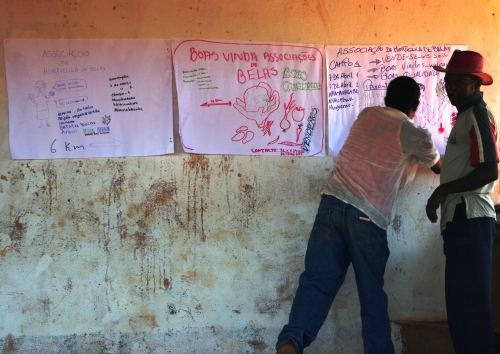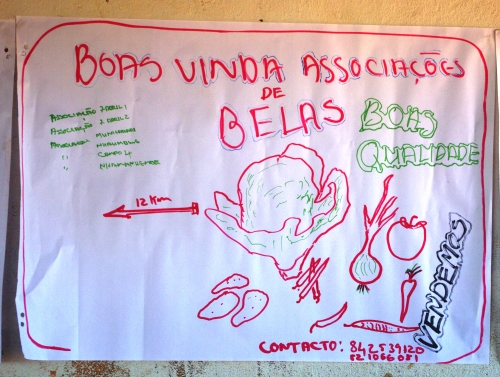Antonio remembers the extraordinary multi-lingual street kid, Benedito, who lived in Quelimane in 1990. Sergio knows Abilio. The seed salesman lived in the same student pousada in Maputo that I did. This trip I even meet the daughter of the former ambassador to the US to whom I once wrote a letter and actually received a reply. But Elliot, the chef at the lodge where I am staying has no idea the Belas Association farmers exist and travels to Chimoio to buy his cabbage. He was shocked when I told him the cabbage he was buying came from nearby- that the guys he was buying from traveled out here to purchase the cabbage he bought in the Chimoio markets.
During the farmer trainings we brainstorm places for direct market sales. We talk about cutting out the middleman. We discuss how to overcome lack of transport to and from market. They love the Madison farmers’ market video. Ferai says he is ready to jump up and start a market like that right now.
One of the woman comments how much movement there is and if I ever get to sit down. Ricardo notices details like the bags in my back pocket and the fact the vegetables are transported in a refrigerated truck. Rafael, who turns out to be the star of the role-playing, likes that I am laughing with the customers. All of them even like that all the customers only walk in one direction around the capitol square.
But somehow after role playing various direct market sales scenarios an animated discussion begins. I’m lost. It’s all in Shona. I finally interrupt and ask for a translation. It turns out they are listing all the things that won’t work with every direct sales outlet on our list. Too small, too far, not enough people live or work there, we don’t know anyone there. I try to explain this is about creating a new future- that it is in fact more than that- it is about controlling their future. Collin, who is accompanying us for the day, tells the story of the women we gave a ride to in the morning. They were tobacco traders from Zimbabwe. One was carrying an infant. The both carried large sacks of dried tobacco scavenged from the harvest leftovers. Twice a month they crossed the border to Mozambique and traveled to the Belas District to trade the tobacco for vegetables. They were determined to change their life. They knew they had to do something and just could not sit back and discuss all the reasons they could not do something. If they can take risks, why can’t you? It had an impact. Heads nodded. The conversation then turned to how do we solve our transport problem? When we travel to the cities to sell how do we make sure we do not get ripped off? Who can we trust? How can direct sales benefit us? Do other more progressive wholesalers exist who would be willing to buy a wider range of product? Do we have to give up our Vanduzi contracts and sales to the wholesale buyers? Let’s make signs for the highway so that customers know we exist.
Diversification. Hope. A new future. I feel the connections being made in their minds. I see eyes light up.
I’m not a person considered a super-connector by Facebook or LinkedIn standards, but I remember things and I ask a lot of questions. I remember faces. I forget the names of streets, but I can still find my way around Maputo and guide the driver to my old student lodgings along the railroad tracks. I listen carefully. And here in Mozambique I talk a lot. I hope one day that my endless story-telling, questioning and listening leads me to discover Benedito’s story after he was taken from the Quelimane streets and adopted by a well-off man in Maputo. Does he still speak seven languages? Has he had a good life? I hope his eyes are still shinning the way I remember them. I hope he is still open and friendly to everyone. I hope he now speaks ten languages and has a PhD. I hope the farmers try something new.







